Coin Values Moving with Precious Metals: Up-Dated 1/5/2026: Gold $4419 | Silver $75.36
1910 Penny Value
How to accurately judge 1910 penny value. A "semi-key" issue is part of the 1910 production of Lincoln pennies. San Francisco mintage of cents produced a coin that has become scarce today. It is necessary to correctly identify your 1910 wheat cent.
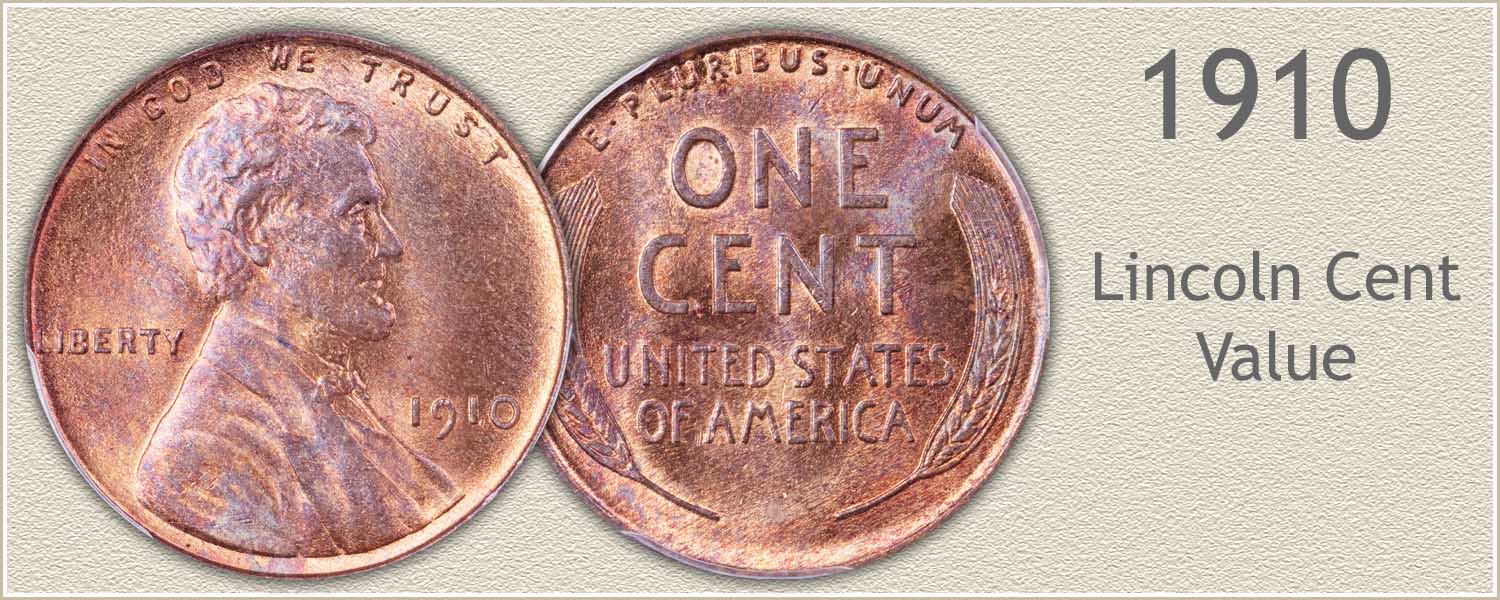
Steps Leading to Value:
- Step 1: Date and Mintmark Variety – Identify each date and its mintmark variety.
- Step 2: Grading Condition – Judge condition to determine grade.
- Step 3: Special Qualities – Certain elements either enhance or detract from value
| 1910 Lincoln Penny Value | ||||
|---|---|---|---|---|
| Condition of Coin | ||||
| Date | Good | Fine | Extremely Fine | Uncirculated |
| 1910 Lincoln Penny Value Up-Dated | 2026 | |||
| 1910 | $0.45 | $1.19 | $4.01 | $12 |
| 1910 S | $6.83 | $16 | $40 | $67 |
Correctly judging: Date | Mintmark | Condition is the process to finding how much your 1910 penny is worth. Popularity of the series and demand for these coins shows itself in the range of values each coin can have. Close inspection is needed to accurately value an old wheat penny.
Listing on the chart are separated by mintmark and condition. Judging the grade of the coin is as important as date and mint. First determine the mint that struck the coin. Secondly, be sure to review the grading section just below to complete the value process.
Step 1: | Date and Mintmark Combination
Identify the Important Mintmark
Collectors pay close attention to both the date and importantly the mint that struck 1910 cents. Values differ depending on the rarity. San Francisco mint pieces are uncommon and are known as a "semi-key" and valued with a high premium. Because of these high premiums recognition of exact variation is needed.
1910 Lincoln Penny
No Mintmark Under Date: Philadelphia Mint Struck the Coin
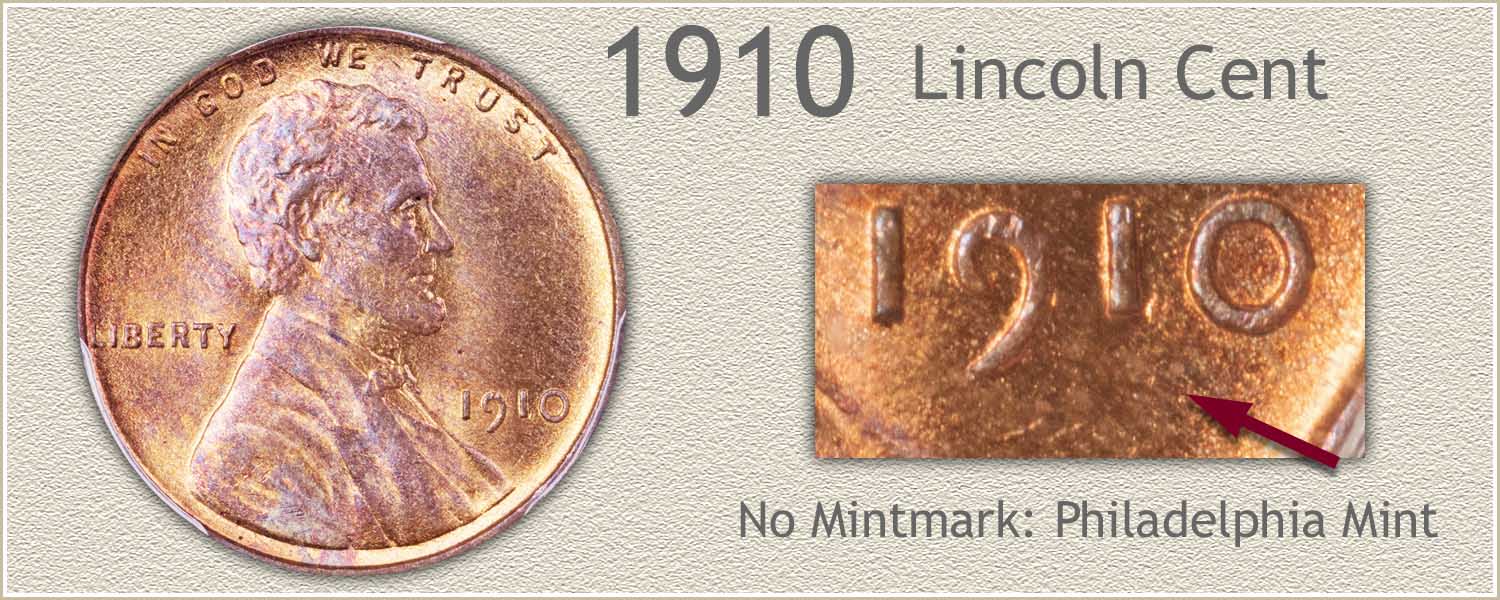
1910 is a needed date by collectors working on sets of early year Lincoln cents. On a rarity scale, circulated examples are abundant in worn circulated condition. What sets a coin apart in value is nice eye appeal in any grade. A sharpness to the "look" of the coin adds to its appeal and a quick jump in value in Extremely Fine condition.
1910-S Lincoln Penny
"S" Mintmark Under Date: San Francisco Mint Struck the Coin
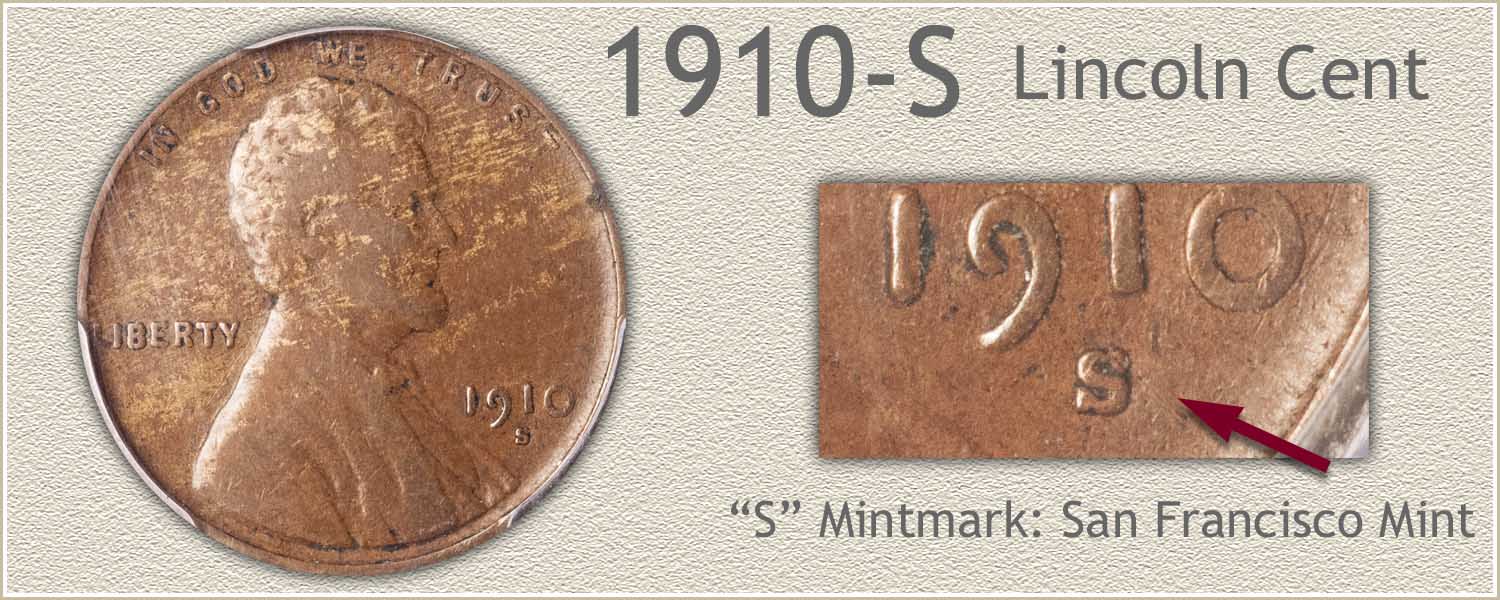
1910-S penny is a mini treasure. Not often found and considered a scarce semi-key. Grading plays an important role to value. Although worth a nice premium in any grade, if Lincoln is sharp in detail with distinct waves to his hair and beard it is a valued find.
Overall operations at US Mints were scaled back in 1910 thus flowing over to production numbers of San Francisco minted pennies. With a beginning of a small mintage these coins, as represented in the value chart are scarce today.
Step 2: | Judge Condition to Identify Grade
Grading Confirms 1910 Lincoln Penny Value
Depending on condition - the grade of your 1910 penny, values cover a large span. View the images of coins in different grades and compare your coin to each. A close match when comparing the amount of detail and wear gives a good indication of condition.
Review the uncirculated example image first, it gives a good illustration of the complete amount of original detail on a coin without any wear to the surface.
Work over a soft surface when viewing, tilt the coin under a light helping bring out subtle details.
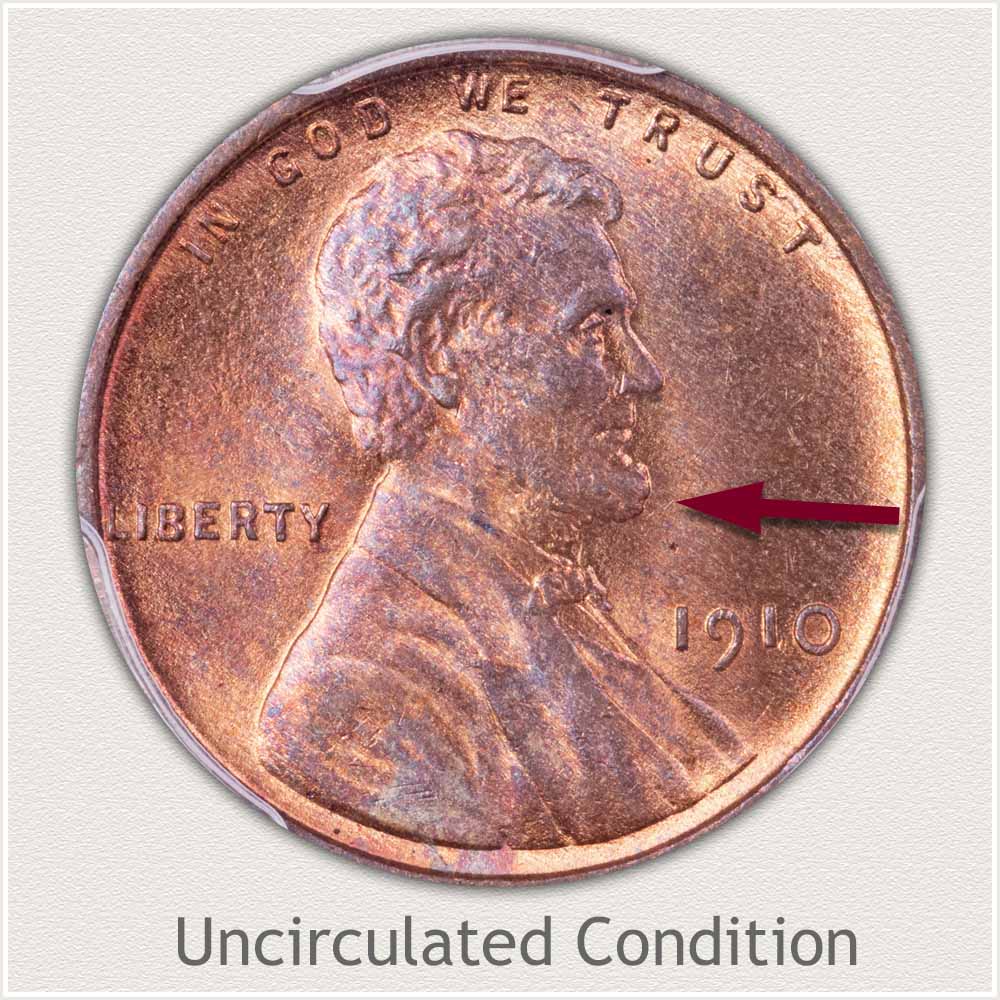
Uncirculated Grade: An uncirculated coin has no wear to its surface. Copper coins tone a variety of shades of brown over time but is not an indication of circulation wear. When judging grade, looking "through" the toning to the actual surface of the coin is necessary.
With all original design detail still intact view Lincoln's chin. It is covered with a beard clearly showing details. Many subtle high and lower areas are visible. Toning, as is often the case with copper, is laying lightly over the surface, however no actual smoothing to the metal is evident. Wear would show at Lincoln's chin very quickly if a coin entered circulation.
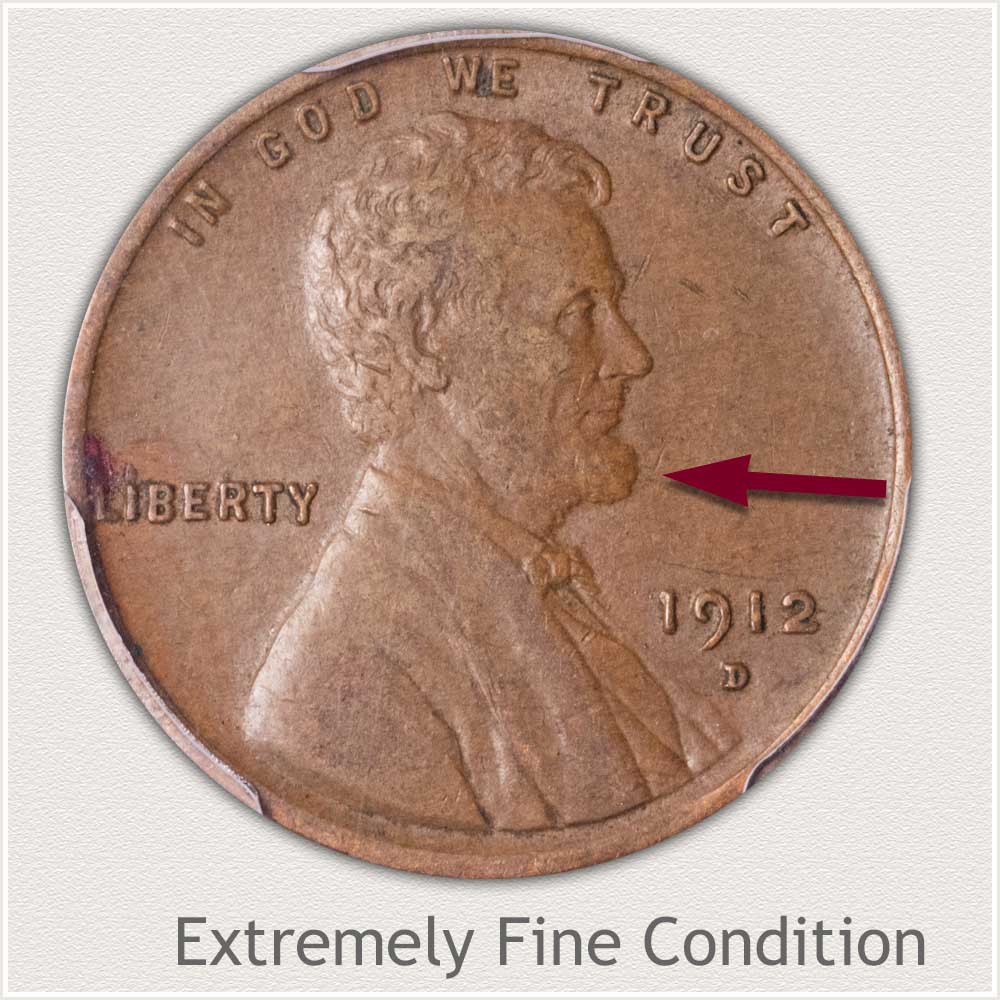
Extremely Fine Grade: Light wear displays evenly on the surface of a Lincoln cent in extremely fine grade.
Judging closely the chin area, small amounts of wear show as scattered flattened spots. Importantly none of these flat spots connect. A clear separation is found between the chin and the lower jaw line. A raised profile to the chin remains.
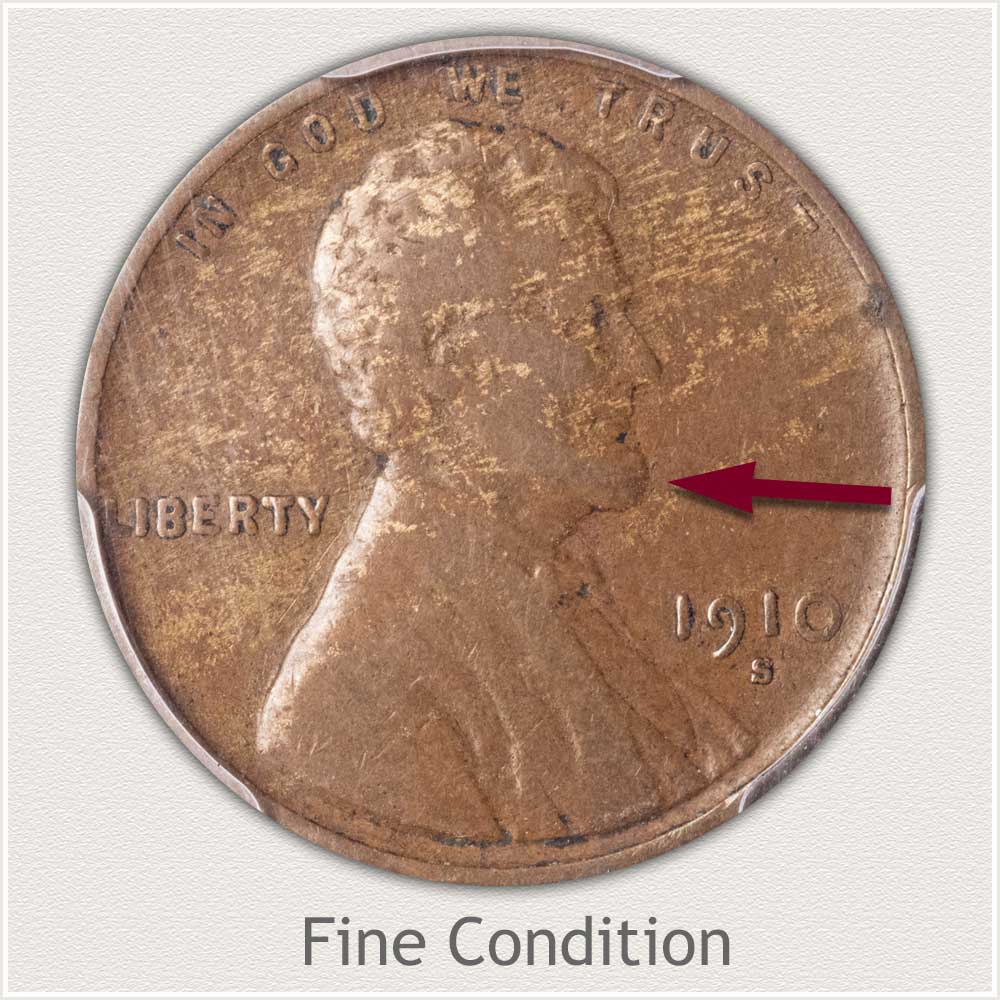
Fine Grade: Wear has begun to flatten the highest profile areas of the design. Missing are many of the smaller details. A Fine grade does have a certain sharpness with many parts of the hair and coat defined.
Lincoln's chin and evidence of his beard is now worn smooth. Once a high area to the design, the chin in now worn lower and a small flat area connects to the jaw line.
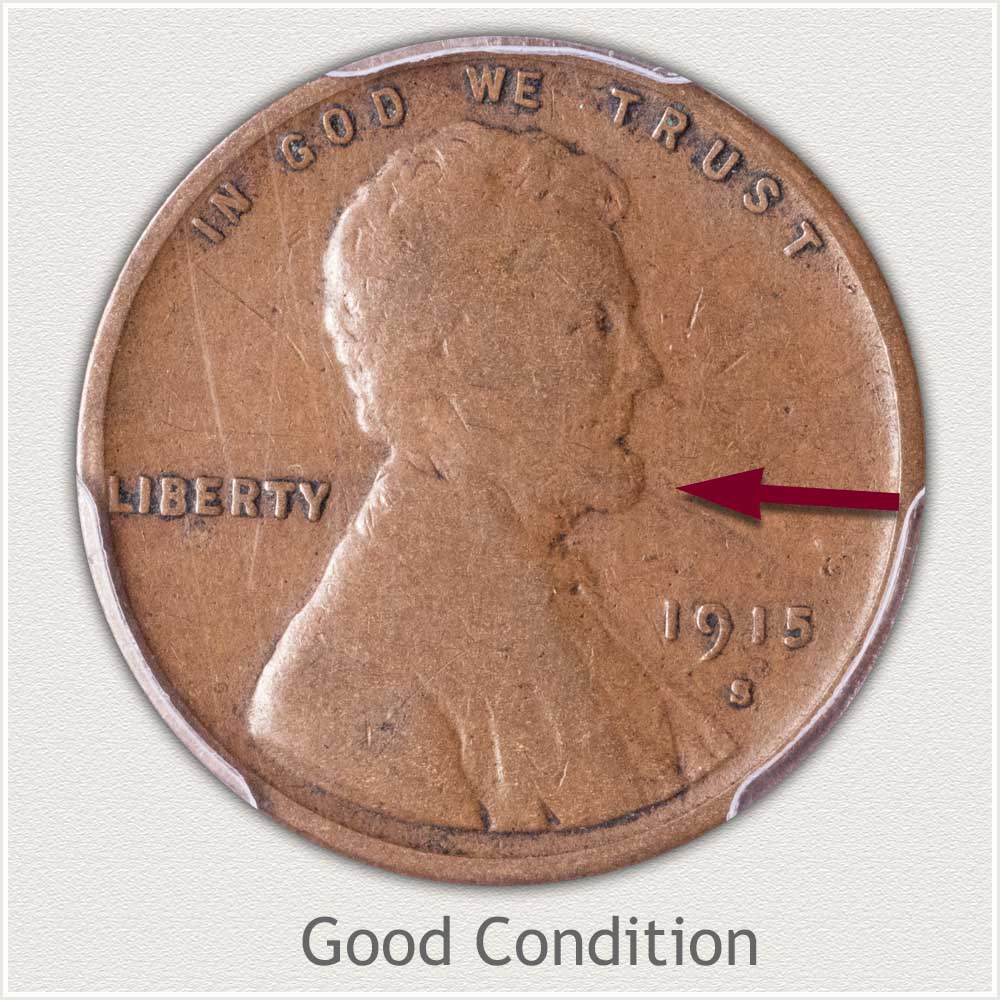
Good Grade: Lincoln's profile is now worn almost smooth. In the "Good" grade most major detail is missing.
A once pronounced chin covered in a beard is now smooth and just an outline. Completely flat is the chin and jaw with just a trace of a neckline. Due to the high relief of the overall design and lettering, these early wheat pennies in the good grade still retain a certain charm and appeal to many collectors.
Grading Lincoln Wheat Pennies covers additional points in greater detail when judging condition. Both the obverse and reverse of these wheat pennies have many areas to examine to help confirm and establish a grade. When grading is complete you are in a position to realize true market value.
Step 3: | Special Qualities Enhancing Value
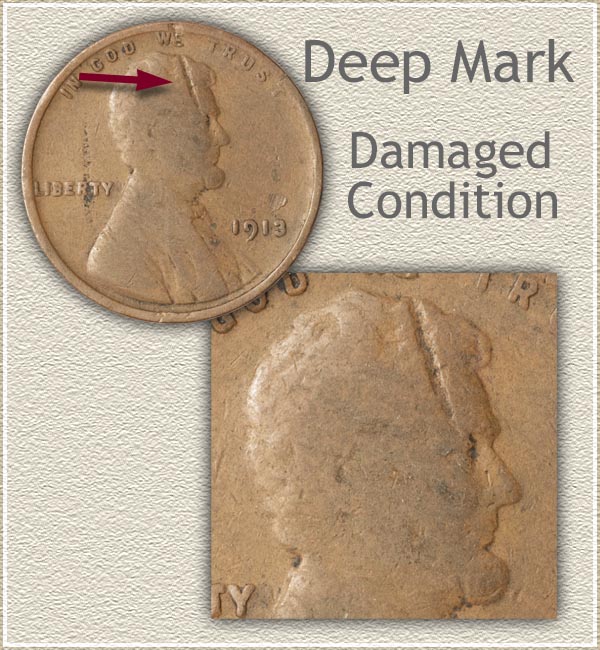
It may not seem like much at first look, but damage to the surface of a coin often has a serious impact to value. These various distractions are very much a consideration to a collector. Their decision to include a coin with large nicks or scratches in their collection is a difficult one.
Damage to a coin is judged in levels of severity and its impact on value - desirability. Viewing the 1913 cent, a large cut into Lincoln's portrait evokes an expression of "ouch". Value of the coin to a collector would drop considerable.
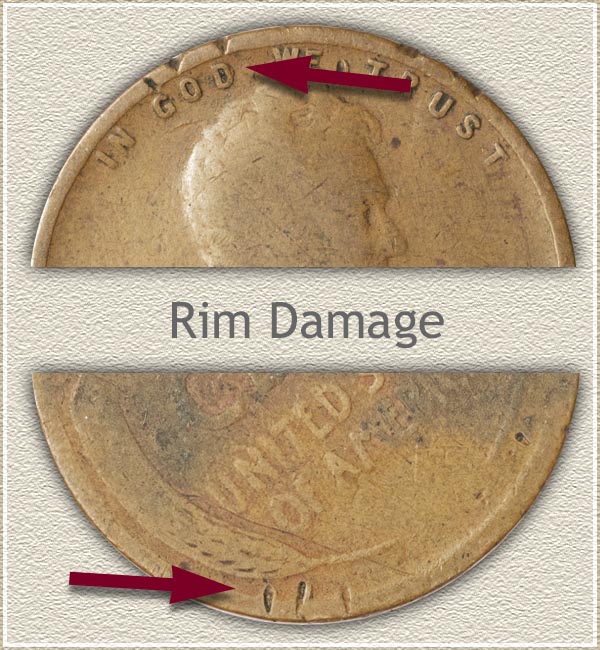
Smaller size marks are also considered carefully. Viewing along the outer edges of the two examples revels small size damage. Although these marks are on and near the rim, they represent imperfections despite the scale and location. Looking through the eyes of a collector this type of damage is likely to severe to accept.
Values dictate a close scrutiny and penalty for any type of distraction to overall eye appeal. Be conservative when grading and judging eye appeal of any coin.
US Treasury. History of the Lincoln Cent https://www.treasury.gov/about/education/Pages/lincoln-cent.aspx
US Mint. 1910 US Mint Report https://nnp.wustl.edu/library/publisherdetail/51
Coin Values | CoinStudy Articles
Value chart spans the Wheat design years 1909 through 1958 of Lincoln cents. From uncirculated coins collected by advances collectors to worn examples an affordable collection popular with young collectors. Identify date, mint and condition; a wide range of values is found and identified.
★ Coin Values Discovery finds 1910 Penny Value and...
US coin value charts covering cents to gold. Identify your coins using the image links. Date | Mintmarks | Condition are described and imaged with each series. Small details necessary to accurately value are described.